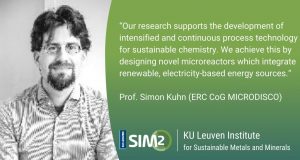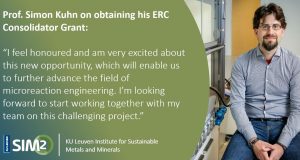Today we’d like to bring you a chemical crossword created by María Jesús that we hope you find interesting. (In case you decide to write on your computer screen, we suggest using non-permanent markers and public computers)

1. To make or become intense or more intense.
2. The process of translating an idea or invention into a good or service that creates value for which customers will pay.
3. Something that makes a chemical reaction happen more quickly without itself being changed.
4. Different way of thinking about how chemistry and chemical engineering can be done.
5. Performing or functioning in the best possible manner with the least waste of time and effort; having and using requisite knowledge and skills.
6. Uninterrupted in time; without cessation.
7. Capacity of a physical system to perform work.
8. Material (an element, compound, or alloy) that is typically hard, opaque, shiny, and has good electrical and thermal conductivity.
9. European Training Network for Continuous Sonication and Microwave Reactors.
10. Refers to the process whereby something is prepared or excited for a subsequent reaction.
11. Particles between 1 and 100 nanometres (nm) in size with a surrounding interfacial layer.
12. Sound waves with frequencies higher than the upper audible limit of human hearing.
13. Production of a substance from simpler materials after a chemical reaction.
14. A very short electromagnetic wave used for cooking food or carrying out chemical reactions.
15. Microporous, aluminosilicate mineral commonly used as commercial adsorbent and catalyst.
16. Place from where things originate.
17. Organized activity aimed at imparting information and/or instructions to improve and help.
18. Ball of gas that appears in a liquid, or ball formed of air surrounded by liquid that floats in the air.
19. To move along in a stream.
Solutions
1. Innovation: The process of translating an idea or invention into a good or service that creates value for which customers will pay.
2. Intensification: To make or become intense or more intense.
3. Catalyst: Something that makes a chemical reaction happen more quickly without itself being changed.
4. Green: Different way of thinking about how chemistry and chemical engineering can be done.
5. Efficient: Performing or functioning in the best possible manner with the least waste of time and effort; having and using requisite knowledge and skills.
6. Continuous: Uninterrupted in time; without cessation.
7. Energy: Capacity of a physical system to perform work.
8. Metal: Material (an element, compound, or alloy) that is typically hard, opaque, shiny, and has good electrical and thermal conductivity.
9. Cosmic: European Training Network for Continuous Sonication and Microwave Reactors.
10. Activation: Refers to the process whereby something is prepared or excited for a subsequent reaction.
11. Nanoparticle: Particles between 1 and 100 nanometres (nm) in size with a surrounding interfacial layer.
12. Ultrasound: sound waves with frequencies higher than the upper audible limit of human hearing.
13. Synthesis: the production of a substance from simpler materials after a chemical reaction
14. Microwave: a very short electromagnetic wave used for cooking food or carrying out chemical reactions.
15. Zeolite: microporous, aluminosilicate minerals commonly used as commercial adsorbents and catalysts.
16. Source: Place from where things originate.
17. Training: Organized activity aimed at imparting information and/or instructions to improve and help.
18. Bubbles: a ball of gas that appears in a liquid, or a ball formed of air surrounded by liquid that floats in the air
19. Flow: To move along in a stream.




